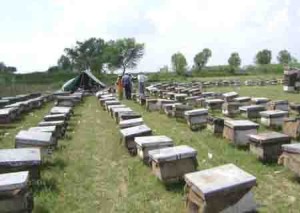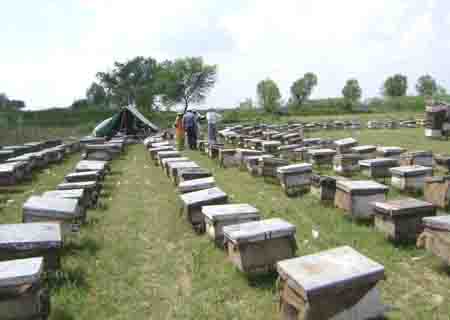TRAINING AND ENCOURAGEMENT BY LUPIN HELPS YOUTHS ACHIEVE SUCCESS
 Jaipur, Sept 26,2015. Some of the nondescript and backward areas in Bharatpur district of eastern Rajasthan are witnessing a delightful transformation with the beekeeping activities changing the face of the rural economy. In the wake of shrinking size of agricultural land, impact of climate change and increasing costs of farm inputs, honey production has been taken up on a massive scale as an alternative livelihood model in the district.
Jaipur, Sept 26,2015. Some of the nondescript and backward areas in Bharatpur district of eastern Rajasthan are witnessing a delightful transformation with the beekeeping activities changing the face of the rural economy. In the wake of shrinking size of agricultural land, impact of climate change and increasing costs of farm inputs, honey production has been taken up on a massive scale as an alternative livelihood model in the district.
One such village which has undergone a complete change under the guidance of experts, leading to about 60 per cent of its population engaged in the initiative and getting immense benefits, is Nagla Kalyan, situated in Rupbas tehsil near Uchchain town of Bharatpur district. The village with a population of only 150 families today boasts of having 300 colonies of honeybees and getting an annual income of Rs. 1 crore from the occupation.
With the expert guidance provided by the Lupin Human Welfare and Research Foundation, honey production has evolved as a viable livelihood enterprise in Nagla Kalyan. It has provided employment to jobless youths, landless labourers and small and marginal farmers. A helpful factor in popularizing beekeeping in the largely rural setting has been its adoption by the locals as an agriculture-based activity.
Besides providing training to the youth in the beekeeping work, the Lupin HW&R Foundation, which is the corporate social responsibility wing of pharmaceutical major Lupin, also arranged for loans from financial institutions. This has ensured direct attachment of the village’s population with the avocation, bringing to it a reputable title of the beekeepers’ village.
Lupin HW&R Foundation made a beginning in Nagla Kalyan by providing training to some energetic and ambitious youths, such as Hardayal, Harbhajan and Harveer, six years ago. After obtaining loans from financial institutions, the youths started the work in the first phase with eight bee colonies each.
Experts from Lupin HW&R Foundation, who regularly visited the village, apprised the youths of the methods to overcome the initial difficulties and trained them in getting more products in addition to honey. Though the progress in the initial few years was slow, the young rural entrepreneurs zealously continued their work with constant encouragement provided by the Foundation.
The incessant and combined efforts have now borne positive results, as a large number of bee-boxes are visible in the region at time of sowing of the predominant mustard crop during winter. The potential of apiculture has been reaped through mustard cropping, as honeybees carry out cross-pollination of the yellow mustard flowers, leading to 20 to 25 per cent increase in crop yield as well.
According to a rough estimate, the bee-breeders in Nagla Kalyan are producing about 50 tonnes of honey annually, which ensures an income of Rs. 1 crore every year to the village’s youths after deducting the input costs. The village seems to have provided leadership in the occupation, as the residents of nearby villages such as Panah, Nekpur and Rahimpur have also started adopting it.
The entire Uchchain region is set to become a beekeepers’ hub in the near future, as the villagers perform their agricultural works during the time left after the main occupation. The entire families assist the youths in shifting of bee-boxes during the changing atmosphere and flowering seasons in order to ensure that the honeybees are subjected to the minimum damage.
Significantly, the income generated by the beekeeping activities has led to a discernible change in the lifestyle and financial condition of bee-breeders. They have built large houses in the villages and started sending their children for higher education. Beekeeper Hardayal’s son is a student of B.Tech. in a reputed institution of Tamil Nadu, while several others are getting higher education elsewhere.
A contest seems to be on to earn more from beekeeping, with the youths also getting technical training for collection of pollen grains and royal jelly in addition to honey production. Honey is the new buzzword in the region, as the Lupin HW&R Foundation is making an attempt to connect with the work as many youngsters and farmers as possible.
An important aspect of honey production is that the honey exporters purchase the product directly from bee-breeders without the intervention of middlemen in view of the heavy demand for honey and wax in the western countries.
As important agri-inputs, honey bees reduce the use of fertilizers and water and increase the yield of oilseeds, pulses, fruits, vegetables, fodder seeds and fibre crop seeds. The only requirement for the low investment and high income proposition is care, a colourful nectar-friendly flowery environment and protection. It also fits appropriately into the principles and practices of optimal and balanced exploitation of natural resources.
As a result of sustained efforts during the last two decades, the total honey production in Bharatpur district has increased from a mere 28 metric tonnes in 1997-98 to a phenomenal 1,280 tonnes this year, the export of which also brings precious foreign exchange to the country. An estimated 2,000 people are associated with beekeeping in the district, which enjoys a lion’s share in the total annual honey production of Rajasthan.
Kalyan Singh Kothari
Media Consultant, Lupin Human Welfare & Research Foundation
Mobile: 9414047744

